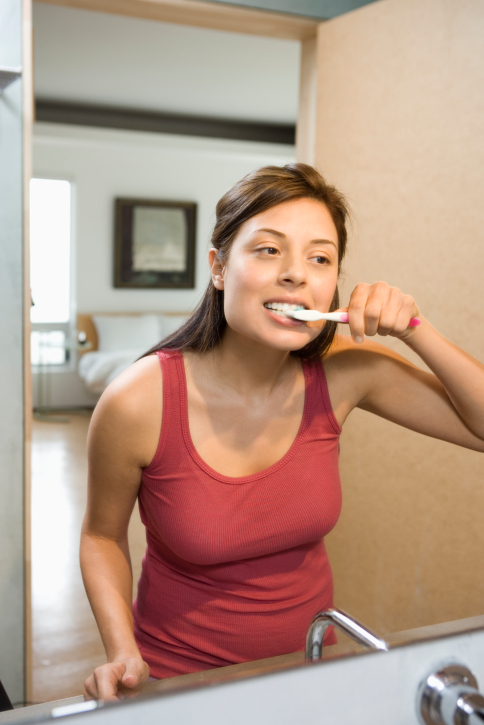Uncategorized
Study Finds Ancient Ancestors Had Better Oral Health
While you might assume that people today have significantly better oral health than our ancestors, a new study suggests that isn’t necessarily the case. The Roman-British population from 200 to 400 AD actually appears to have experienced far less gum disease than people do today, according to a new study that examined the skull collection at London’s Natural History Museum. Researchers at King’s College of London conducted the study. The surprising findings of this study may provide even more evidence that modern habits such as smoking can damage our oral health.
A Look Back
Gum disease, known as periodontitis in its more advanced stages, results from a chronic inflammatory response to the buildup of oral plaque. While a large percentage of the world’s population suffers from some form of gum disease, factors like tobacco smoking or medical conditions like diabetes can cause gum disease to develop more aggressively, which can lead to tooth loss.
Published in the British Dental Journal, the study examined over 300 skulls discovered at a Romano-British burial ground in Poundbury, England for signs of oral disease. Just 5 percent of the skulls examined showed signs of moderate to severe gum disease, compared to the world’s modern population, of which between 15 to 30 percent suffer from advanced periodontitis.
However, many of the Roman skulls, which came from the Natural History Museum’s paleontology department, showed traces of abscesses and infections, and half showed signs of tooth decay. The population at Poundbury also showed pronounced signs of tooth wear starting at a young age, as would be expected from a population that consumed a diet of cereals and coarse grains.
The community living at Poundbury during the time period share many genetic traits with modern Europeans. This community was non-smoking and probably experienced very few cases of diabetes, two known risk factors for gum disease today. Among the population group in Poundbury that survived infancy, childhood illness, and malnutrition to reach adulthood, the average lifespan was into the mid-40s. The most common cause of death at the time is believed to have been infectious disease, which makes the lack of gum disease all that more surprising to researchers.
Modern Conclusions
Researchers involved with the study were surprised to discover that severe cases of gum disease were far less common in Roman British population when compared to modern day, despite the fact that our ancestors did not brush their teeth or visit the dentist as people do today. Gum disease, however, is not a modern phenomenon, as traces of the disease have been found in the remains of ancient Egyptians and referenced in writings from early Sumerians, Assyrians, Babylonians, and Chinese.
Researchers believe their study shows that a major deterioration in oral health has occurred between the time of ancient man and today. This helps to establish the underlying role smoking plays, especially in relation to increasing the susceptibility to progressive gum disease in modern populations, and indicates that gum disease can be avoided. Researchers believe that as the number of people who smoke decreases around the world so to will the prevalence of gum disease.
If you have any questions about gum disease, smoking, or your own dental history, please call our Southwest Portland dental office today and we will happy to answer your questions.
Survey Finds Americans Could Improve Oral Care
Most people practice it twice daily – once before bed and again after getting up in the morning – for an average of one minute and fifty-two seconds. These are just a few of the finding on tooth brushing from the Delta Dental Oral Health and Well-Being Survey.
Nearly 70 percent of Americans brush their teeth at least twice day, the number recommended by the American Dental Association and dentist everywhere. However, that still leaves 30 percent of the country’s population as not brushing enough, states researchers involved with the study.
The average American brushes for slightly under the two minutes recommended by the ADA and most dental professionals. African Americans brush 18 seconds longer than the average American, while young adult between the ages of 18 to 24 spend 16 seconds longer than the average.
Nearly six out of 10 Americans brush their teeth at bedtime and shortly after waking in the morning, while 38 percent brush following breakfast. The study also found that 17 percent of the country brushes after lunch, and that 21 percent brush following dinner.
Based on the data collected by the Delta Dental survey, 91 percent of Americans brush at home in the bathroom while standing over the sink. No surprise there. However, 4 percent of survey respondents said they brush in the shower. Americans between the ages of 18 to 44 are actually twice as likely to brush in the shower. (Lets hope the don’t toothpaste in their eyes.)
Perhaps most disturbingly, the study found that 0.2 percent of Americans actually brush while driving. Talk about distracted driving.
Brushing Linked to Positive Oral Health
Brushing at least twice a day with toothpaste that contains fluoride ranks as a key component to quality oral health, say researchers. According to the survey, individuals who brush at least twice a day are 22 percent more likely to describe their oral health as good when compared to those who brush less frequently.
While much of the data collected by the Delta survey indicated positive trends in American oral health care, not all of the data was good. The survey found that 23 percent of Americans have gone two or more days without brushing during the last year, and that nearly 37 percent of adults between the ages of 18 to 24 have gone at least that long without brushing.
Flossing is another area of oral health that could stand improvement. Only four out of 10 Americans, 41 percent, flossed daily, and 20 percent don’t floss at all. The survey found a strong link between reporting good oral health and flossing daily.
Be Sure to Brush First
On the lighter side of topics covered by the survey, Delta found that 33 percent of Americans request their partners brush their teeth prior to a kiss. Women were far more likely than men to request a pre-kiss brushing, said researchers.
If you have questions about dental care for you family, then please contact the best choice for SW Portland family dentists: Southwest Portland Dental, today!
What’s the Best Way to Brush?
If you don’t know the best way to brush, you’re not likely to receive much help from the experts. Toothpaste and toothbrush manufacturers and dental associations don’t seem to agree on what constitutes the best way to brush, and the advice they provide consumers is “unacceptably inconsistent,” reports the findings of a new study.
Researchers at University College London took a look at the recommended brushing techniques suggested by toothbrush and toothpaste manufacturers, dental textbooks, and dental associations from 10 countries. Researchers discovered a wide variety of recommendations on the best brushing practices, how often an individual should brush and for how long, according to the study that was recently published in the British Dental Journal.
Researchers feel that such an inconsistent messaging regarding proper oral care undermines the public’s health as a whole. When individuals hear conflicting advice from health professionals and oral health product manufacturers about the best way to brush, it can become confusing and they can begin to develop poor oral health habits as a result. The study found the recommendations to be what researchers described as “unacceptably inconsistent.”
Dental associations need to make a better effort at staying consistent with the recommendations they dispense, advocated the study’s findings. Researchers were concerned when they discovered that some of the recommendations for brushing offered by dental associations contradicted what was published in many dental textbooks. No evidence exists that suggest more complicated brushing techniques better clean an individual’s teeth, which makes the varying recommendations so confusing.
The study determined the most frequently recommended way to brush was for patients to gently move the toothbrush back and forth in tiny circular motions in order to remove bacteria, plaque, and food particles. However, no evidence supports this technique works any better than using just a basic scrubbing motion.
Rather than focus on technique, researchers suggest focusing more on thoroughly cleaning every quadrant of the mouth, both back and front of the teeth. Make sure to use a brush that comfortably fits in your mouth, and that has a handle that’s easy to grip. If you have any other questions about how to brush, make sure to ask Drs. Jarvis or Goldwyn during your next appointment.
What's the Best Way to Brush?
 If you don’t know the best way to brush, you’re not likely to receive much help from the experts. Toothpaste and toothbrush manufacturers and dental associations don’t seem to agree on what constitutes the best way to brush, and the advice they provide consumers is “unacceptably inconsistent,” reports the findings of a new study.
If you don’t know the best way to brush, you’re not likely to receive much help from the experts. Toothpaste and toothbrush manufacturers and dental associations don’t seem to agree on what constitutes the best way to brush, and the advice they provide consumers is “unacceptably inconsistent,” reports the findings of a new study.
Researchers at University College London took a look at the recommended brushing techniques suggested by toothbrush and toothpaste manufacturers, dental textbooks, and dental associations from 10 countries. Researchers discovered a wide variety of recommendations on the best brushing practices, how often an individual should brush and for how long, according to the study that was recently published in the British Dental Journal.
Researchers feel that such an inconsistent messaging regarding proper oral care undermines the public’s health as a whole. When individuals hear conflicting advice from health professionals and oral health product manufacturers about the best way to brush, it can become confusing and they can begin to develop poor oral health habits as a result. The study found the recommendations to be what researchers described as “unacceptably inconsistent.”
Dental associations need to make a better effort at staying consistent with the recommendations they dispense, advocated the study’s findings. Researchers were concerned when they discovered that some of the recommendations for brushing offered by dental associations contradicted what was published in many dental textbooks. No evidence exists that suggest more complicated brushing techniques better clean an individual’s teeth, which makes the varying recommendations so confusing.
The study determined the most frequently recommended way to brush was for patients to gently move the toothbrush back and forth in tiny circular motions in order to remove bacteria, plaque, and food particles. However, no evidence supports this technique works any better than using just a basic scrubbing motion.
Rather than focus on technique, researchers suggest focusing more on thoroughly cleaning every quadrant of the mouth, both back and front of the teeth. Make sure to use a brush that comfortably fits in your mouth, and that has a handle that’s easy to grip. We are proud to offer the best family dental care Portland has to offer, so if you have any other questions about how to brush, make sure to ask Drs. Jarvis or Goldwyn during your next appointment.
How Medications Impact Your Oral Health
If you take any type of medication – whether prescribed or over-the-counter – you’ve probably read through the long list of potential side effects those medications can cause. Some of the most commonly prescribed medications feature a range of side effects that include everything from blood clots to skin discoloration. While most side effects certainly sound undesirable, one of threatening side effects that most people don’t consider is how some types of medication can impact the health of your teeth and gums. Below, we have listed just a few of the most common oral-health related side effects you can suffer from taking medication.
Abnormal bleeding. Anticoagulants, aspirins, and other blood thinners are useful when preventing heart disease or stroke, but they can also cause your gums to bleed, especially during any type of oral surgery. Make sure to let Dr. Jarvis know if you’re taking any medications prior to undergoing any procedure so precautions can be taken to minimize bleeding.
A change in taste buds. Certain types of medications, such as nicotine skin patches, cardiovascular drugs, and some brands of respiratory inhalers can cause a bitter or metallic taste to develop in the mouth, and some could even alter the way you taste food entirely. If you can’t stomach this side effect, discuss with your physician about changing your medication.
Reactions in soft-tissue. Prescriptions that have been found to cause inflammation, mouth sores, or discoloration of soft tissues in the mouth are typically chemotherapy drugs, oral contraceptives, and blood pressure medications. If you suffer from any of these symptoms, Dr. Jarvis can recommend a dental care regimen that can help reduce any discomfort.
Swollen gums. Gingival overgrowth, a condition that causes gums to enlarge, can be a side effect of taking calcium channel blockers, immunosuppressant drugs, and anti-seizure medications. If you take any of these types of medications, you’ll want to make sure to brush and floss gently, and talk with Dr. Jarvis about specific care instructions.
Increased risk of cavities. There’s a lot of truth in the old adage that a spoonful of sugar helps the medicine go down. Sugar is an incredibly common ingredient in many types medications, including antifungal agents, antacid tablets, vitamins, cough drops, and other types of liquid medications. While it might make it easier to take medication, sugar also makes your teeth more susceptible to the effects of tooth decay. To reduce your risk:
- When possible, take medication in tablet form
- Take medications with a meal
- Avoid taking medication just prior to bed
- Schedule regular appointments with Dr. Jarvis for preventative care




